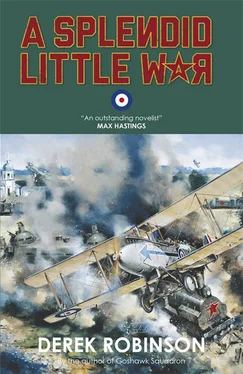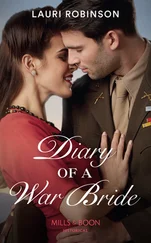The squadron ran out of eggs, onions, marmalade, Gentleman’s Relish, tinned green beans, and pepper.
Lacey led a group into Belgorod and managed to buy twelve cabbages and two dead sheep. It was not easy: inflation was raging, the value of the rouble had slumped. There was no enthusiasm for Denikin’s currency. “He prints it like a newspaper,” Borodin explained. “Fresh every day.”
The C.O. decided to dismantle the aircraft and stow them on the flatbed trucks. While this was being done, the adjutant discovered that the driver and stoker of Oliphant’s train had gone. Decamped. Left for good. Worse still, there was little coal in their tender. “We don’t need two trains,” Wragge said. “Shift everything onto ours. Including the coal.” News arrived: Denikin had lost Kursk.
It took a slow, depressing week to get near Kharkov. Refugee trains often broke down. It was dangerous to stop because refugees mobbed the squadron train, forcing it to travel with locked doors and drawn blinds. There were fewer troop trains, perhaps because the countryside was thick with deserters. Often at night they tried to break in. The adjutant posted riflemen on the roof.
The sheep Lacey bought made mutton stew. Kid, the squadron mascot, disappeared at the same time. Nobody commented.
Kharkov was full of tired soldiers and rumours. The Red Army was carving up Denikin’s flanks, it was said. Tsaritsyn might fall, or had fallen, anyway it was finished. So was Voronezh. And the Ukraine, well, if the Reds don’t get there first the Poles will have it. Heard about Admiral Kolchak? As good as dead. He’s made Denikin the Supreme Ruler. What a joke.
The C.O. stocked the locomotive with coal and water, taken at the point of a gun, and moved south.
Kharkov fell.
A hundred men take a lot of feeding. The Cossack ponies were slaughtered. The squadron ate the last of the black bread.
Summer ends quickly in Russia, and autumn is brief. Greatcoats were being worn when the squadron train rolled into Taganrog. Lacey went to see Henry at the Hotel Olymp and found he had checked out a week ago. The C.O. and the adjutant went to Mission H.Q. A sergeant was in the garden, burning files. He was in his shirt sleeves: there were many files and they generated great heat. “Everybody’s gone to Rostov,” he said. “Me too, as soon as I get through this heap of shit.”
H.Q. had left two sacks of potatoes in its kitchens. Wragge and Brazier carried them back to the train. All Ranks were on a diet of bully beef and biscuit. The stationmaster at Rostov told Borodin that the Red Army would soon take the city and that British Mission H.Q. had gone to Ekaterinodar, where Denikin was rumoured to be making a last stand. The stationmaster’s advice was to make for Novorossisk.
2
Lloyd George was sitting in an armchair next to a window when Jonathan Fitzroy tapped on the door and came in. “Good afternoon, sir,” he said.
“Take a seat, Jonathan. I don’t want you to collapse with shock.”
I’m not going to get the sack, Fitzroy thought. He’d keep me standing for that.
The P.M. was polishing his spectacles with the end of his silk tie. “I wonder if too much reading weakens the eyes,” he said. “Perhaps it actually strengthens them. That would be good. But it hasn’t worked for me… The Services send me monthly bulletins about how things are going in Russia. Their last reports coincided happily with the leaps and bounds made by Denikin’s advance. The soldiers, of course, put that down to their training of his armies. No doubt the War Office is now thinking up excuses for his headlong retreat. The weather is probably to blame. In France the generals always blamed the weather when the war didn’t go quite right. The Navy reported that it was still master of the Baltic, where the hulks of Soviet warships continue to rust. And the Royal Air Force… Well, I have their bulletin here. Read it for yourself.”
Fitzroy undid the ribbon on the folder and flicked through the pages. “Blessedly brief,” he said.
“Well, they haven’t many aeroplanes.”
Fitzroy began reading. Lloyd George turned and looked at the typically grey London weather. Wintry, very wintry. He got up and went to his desk and checked his diary. No surprises there. Fitzroy turned a page. Lloyd George read three letters and signed them. Fitzroy turned another page. Lloyd George picked up the telephone and asked for some tea, if you please, thank you. Fitzroy said, “Oh, damn.”
“Ah, you’ve found it,” the P.M. said.
“Damn and double-damn.” Fitzroy looked up. “The man must have been a maniac. The commander of this squadron, that is. He’s a lunatic. How could he even contemplate… Good God, the consequences would have been immense. And unforgivable. Bombing Moscow would have been like… like the Zeppelins bombing London. Worse!” He stood up and slapped the report against his thigh. “An act of madness.”
“I thought it might excite you.” The P.M. examined his fingernails and found them all present and correct. “I didn’t expect you to be quite so hysterically indignant.”
Fitzroy had held his job long enough to know when to say nothing.
“Your problem, Jonathan, is that you read too many newspapers and not enough history. History teaches us that war does not travel in a straight line. Obstacles spring up that never before existed, and so armies ricochet, and leaders must duck and dodge or they suffer. Last year we nearly joined forces with the Bolsheviks. Even Winston was for it. He wanted to offer them a formula that would protect their revolution and consolidate their power, if only they would re-start their war against Germany. We desperately needed someone to fight for the Allies in the east, and the Bolsheviks seemed the most warlike. But, alas, not for long. Then the Huns collapsed, a very large surprise indeed, since most of us expected the war to go on for another five or ten years. Now we no longer needed an eastern front. But — a little ricochet — Bolshevik revolutions began breaking out in Europe like chicken pox, so we put our money on the anti-Red forces in Russia. Worth a gamble. Nearly paid off. How far from Moscow was this R.A.F. bombing squadron?”
Fitzroy looked in the report. “Two hundred miles.”
“Only two hundred.” The P.M. stretched his arms out sideways. “More or less from here to Manchester. If only Denikin could have kept going, he might have taken Moscow.”
“That was what we had all hoped, sir.”
“And a few bombs on the capital might have been just what was needed to panic the enemy.”
Fitzroy sat down and fanned himself with the report. “Now I’m thoroughly confused. Do you approve of the bombing plan?”
“No, of course not. Lenin would never have forgiven us. He’s prepared to overlook the Intervention. He won’t forget it, but he’ll overlook it if we sign a few lucrative trade agreements with his government. They’re stony-broke, and he has quantities of timber and furs and caviare to sell. The Soviet government is the de facto state, Jonathan. Pity about Denikin. When he was two hundred miles from Moscow he was, alas, at the end of his tether. He tried awfully hard, but second-best in that strange country is… well, they don’t have a second-best. Either you win or you go to the knacker’s yard. Ah, tea. Just what you need to restore your shattered nerves.”
Fitzroy sipped his tea and put the mystery of the non-bombing of Moscow aside. “That would seem to be the end of the matter,” he said. “Air Ministry shows no sign of wishing to court-martial…” He checked the report. “… Acting Squadron Leader Wragge.”
“Very wise. He obeyed orders, he did no wrong. On the contrary, he would claim that bombing Moscow was just what he had been sent to do. His squadron was Denikin’s spearhead. Perhaps if he had bombed Moscow a little sooner, when the Navy was sinking Soviet battleships in the Baltic, we might have given Mr Wragge a V.C., like Lieutenant Agar. Wragge got everything right except his timing. Timing is everything in war. Should we suggest to Air Ministry that Wragge be retired and given a gold watch?” The P.M. smiled. “Joke,” he said.
Читать дальше











